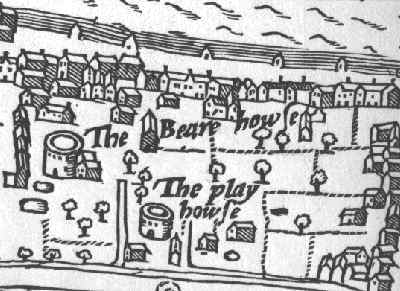The Paris Garden
Teams of mastiff dogs were set loose upon a bear; if they were injured, killed, or timid, others were set on. Sometimes the activities were spiced up further by using a blind bear (see the quotation from Lear on the previous page), or by having men attack the bear with whips. Several bears would be baited at a single session.
In 1591, at the beginning of Shakespeare's career, the growing popularity of the theatres led to a law closing them on Thursdays, so that the games of bull and bearbaiting would not be neglected.
Shakespeare's most unusual stage direction: "Exit pursued by a bear."*
Henslowe again
Philip Henslowe, best known for his skills in running the Fortune and other theatres, spent as much of his time organizing baiting in his theatres and the Paris Garden. With his son in law, the actor Edward Alleyn, Henslowe controlled the sport for several years.
Footnotes
-
An odd exit
In The Winter's Tale, Shakespeare modulates between the tragic mood of the opening three acts and the pastoral comedy of the final two, through a seemingly strange transition of black comedy.
Antigonus abandons the infant Perdita on the sea-coast of Bohemia (see below), after a final regretful speech which he interrupts to cry "This is the chase./I am gone forever." The original stage direction then reads "Exit, pursued by a bear." Shakespeare daringly combines the two expectations of the audience that frequented the theatre, those of drama and bear-baiting.
The "coast" of Bohemia
Of course Bohemia has no sea-coast, a fact that has bothered generations of humourless critics. But this is a winter's tale, where normal conventions are unimportant, and mere improbabilities are certainties.
